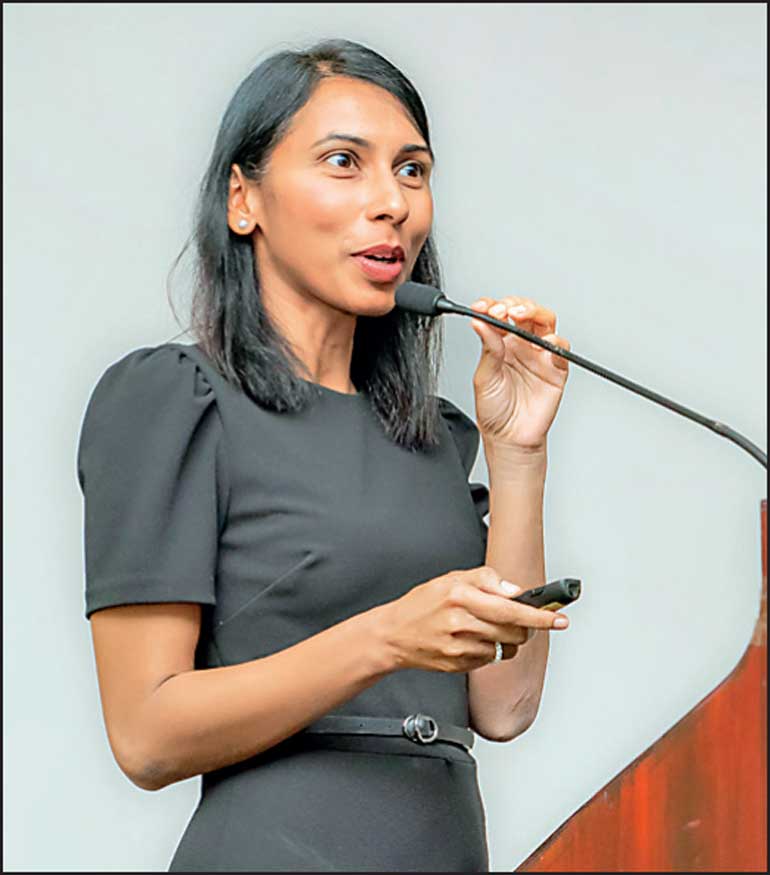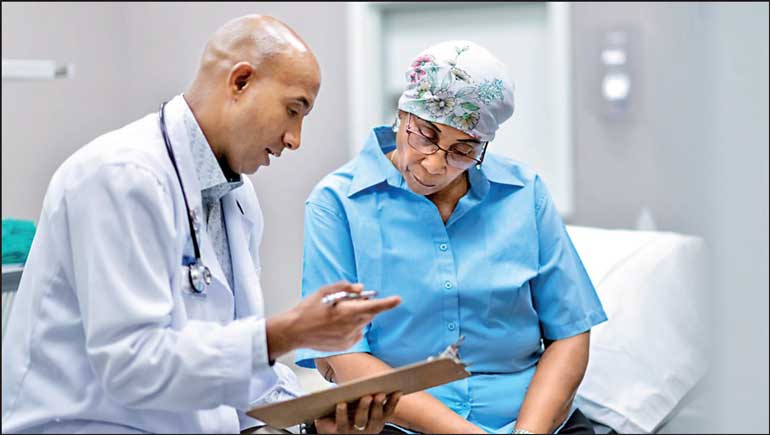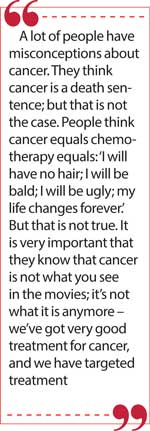Sunday Feb 22, 2026
Sunday Feb 22, 2026
Thursday, 6 June 2024 00:10 - - {{hitsCtrl.values.hits}}

Parkway Hospitals Singapore Senior Consultant Oncologist Dr. Tanujaa Rajasekaran

Patients who are advised to undergo therapy tend to be fearful to do so because of side effects
By Fathima Riznaz Hafi 
Parkway Hospitals Singapore Senior Consultant Oncologist Dr. Tanujaa Rajasekaran at a press interview in Colombo recently spoke about cutting-edge advancement in oncology as well as misconceptions surrounding cancer and its treatment. Dr. Rajasekaran says that people fear treatment as they think it is painful and results in severe side effects, as was the case in the past. But she asserts that with immense developments in oncology, that is no longer the case and such fears should be eliminated.
“Patients who are advised to undergo therapy tend to be fearful to do so because of side effects. Any therapy, be it targeted therapy, immunotherapy, chemotherapy, etc. comes with side effects. But now there is a lot of advancement in terms of supportive care and management care. Most of these side effects can be well-tolerated and can be managed,” said Dr. Rajasekaran.
“In the past when they portray people going through chemotherapy, they are always bald and vomiting away; but we hardly see that anymore. Because we have such good medicine to help with the nausea. Things have changed; it’s not like that anymore. You hardly see patients vomiting like that.
“Side effects are there. For example, when using targeted therapy, taking oral drugs for lung cancer, they can come with side effects like rashes on the face, ulcers in the mouth, diarrhoea, but most of these side effects can be managed very easily when they take anti-diarrhoea pills, they moisturise their skin to prevent the rashes; and it’s generally very well-tolerated,” she explained.
Cancer is not what you see in the movies
“A lot of people have misconceptions about cancer. They think cancer is a death sentence; but that is not the case. People think cancer equals chemotherapy equals: ‘I will have no hair; I will be bald; I will be ugly; my life changes forever.’ But that is not true. It is very important that they know that cancer is not what you see in the movies; it’s not what it is anymore – we’ve got very good treatment for cancer, and we have targeted treatment.
“In fact, with some of the chemotherapy agents that we use, you don’t even lose your hair! And though some of the chemotherapy does cause hairloss, after you stop the chemotherapy, the hair will grow back.
“So it’s important that we don’t form misconceptions based on what we’ve seen in the movies or what someone else who has cancer has gone through. When they see someone else going through something from their cancer, that doesn’t mean they will undergo the same things. They could be going through a different type of cancer, with different medicine and side effects. It’s very important when you are diagnosed with cancer, that you speak to a trusted oncologist, find out exactly what sort of cancer you have, what treatment you need, and the side effects of the treatment.”
Cutting-edge advancement in oncology
Dr. Rajasekaran spoke about the various advancements in cutting-edge technology in the field of oncology and how technology has been an integral part in improving cancer treatment. “In medical oncology in particular, one of the biggest advancements is the introduction of immunotherapy. Immunotherapy is essentially using your own immune system to fight the cancer cells. Typically what you’ve been having is chemotherapy, and chemotherapy generally is like a nuclear bomb – it just goes in and boom – good cells, bad cells – everything goes,” says Dr. Rajasekaran.
“But immunotherapy is a big field of medicine and under it there are many sub-categories; there’s cancer vaccines, cell therapy, CAR T-Cell therapy, and immune checkpoint inhibitors (one of the biggest advancements that’s being used in treating many different cancers).”
Besides immunotherapy the other big thing is ‘precision medicine’ to treat patients. Dr. Rajasekaran explains, “We don’t treat lung cancer as if everybody has the same type of cancer; we find out exactly the particular type of lung cancer that you have and we can give targeted therapy for that. So it’s not a one-size-fits-all kind of thing – it is personalised medicine. For example, in breast cancer we can find out whether you have any genetic mutation that is causing the cancer and then we give you medication specifically to treat that.”
Stage 4 cancer is not the end of the world
 All this treatment can be used in early stage as well as in metastatic Stage 4 cancers. In the past, when people talked about Stage 4 or metastatic cancer they thought, it was terminal, they were doomed. It’s not like that anymore, she says. “Take lung cancer for example; in the past, in the 1970s, if diagnosed with Stage 4 lung cancer, the prognosis was they can live for six months but now it’s not like that – we have patients living up to five years, seven years, eight years, because of the treatment. So, cancer is no longer a terminal disease but more like a chronic disease.”
All this treatment can be used in early stage as well as in metastatic Stage 4 cancers. In the past, when people talked about Stage 4 or metastatic cancer they thought, it was terminal, they were doomed. It’s not like that anymore, she says. “Take lung cancer for example; in the past, in the 1970s, if diagnosed with Stage 4 lung cancer, the prognosis was they can live for six months but now it’s not like that – we have patients living up to five years, seven years, eight years, because of the treatment. So, cancer is no longer a terminal disease but more like a chronic disease.”
“But is there a cure?” mindset needs to change
Dr. Rajasekaran shared stories of her patients who came when in the metastatic stage of cancer and though people think there is no hope after that, her patients are now living normal lives after starting treatment and their cancer is under control.
When asked, since it is now under control and they are getting the treatment and can lead normal lives, does it mean they can be cured, she replied that the “Is there a cure” mindset needs to change. “Actually if you think about it, everybody wants to look for a cure, but in fact, diabetes cannot be cured… high blood pressure cannot be cured… you need to take medication long-term to control it. Stage 4 cancer also, in most cases, cannot be cured but can be controlled; more like a chronic disease, like diabetes and high blood pressure – you take the medication long-term. If you stop taking the medication, of course the cancer will come back. You need to be on medication.”
Is their lifespan still shortened?
Dr. Rajasekaran notes, with Stage 4 cancer, they won’t live as long as they would otherwise have lived (without cancer) but certainly much longer that a cancer patient could live in the past. It used to be six months many years ago and now the average prognosis is they can live around five years, with the treatment. For some people it’s more and for some it’s less. Hence, the patient may not have a long lifespan which he would have had without cancer but can certainly live much longer than a cancer patient was able to live in the past. And it is very important that they receive a good quality of life during this time.
Seek treatment – patients can live much longer now
“A patient had come to me recently. She had a breast lump that was there for a long time, but she just refused to seek treatment. I asked her how long it had been there and she said a few years; I asked her why she didn’t come forward and she said she didn’t want to know what it was. People are just scared that it’s going to be cancer and it would then be the end of the world for them. But it’s not the end of the world. There are many advancements in cancer care and patients can live much longer now,” she said.
“We have one lady with Stage 4 breast cancer; she was first diagnosed in 2015 and she is still now on treatment. She still has Stage 4 breast cancer but she goes to work, she looks after her children. So it’s like a chronic disease but you need to take medication to control it.”
Systemic therapy
Dr. Rajasekaran says when breast cancer reaches Stage 4, there is no point in removing the breasts. “When it is metastatic or Stage 4, when the cancer has spread outside of the breasts, there is no point in just removing the breasts because if the cancer has spread to the lungs already we can’t remove the lungs, and if it has spread to the bones we can’t say we want to remove the bones. So, at this point, ‘systemic therapy’ becomes important; it could be chemotherapy, targeted therapy, hormonal therapy – something that goes through the blood stream and targets cancer cells all over the body. That way it cannot spread to the rest of the body. That’s the aim – to control it so that whatever is there, we kill it and control the condition so that it doesn’t spread to new places.”
“But usually after some time the cancer cells will become resistant to whatever we are giving so we need to change to a different medication.” Asked how we would know when they have become resistant, she said they do regular scans and blood tests and usually patients follow it up with them for the long-term.
Dr. Rajasekaran added that it is not enough to only take care of the physical health – it is very important that the psycho-social and emotional part of the patient’s journey is also attended to. In Parkway Singapore’s CanHope, a non-profit organisation, they have a strong focus on the patient’s psycho-social aspects in addition to the physical health, and provide emotional support for the patient through therapy, such as art therapy.